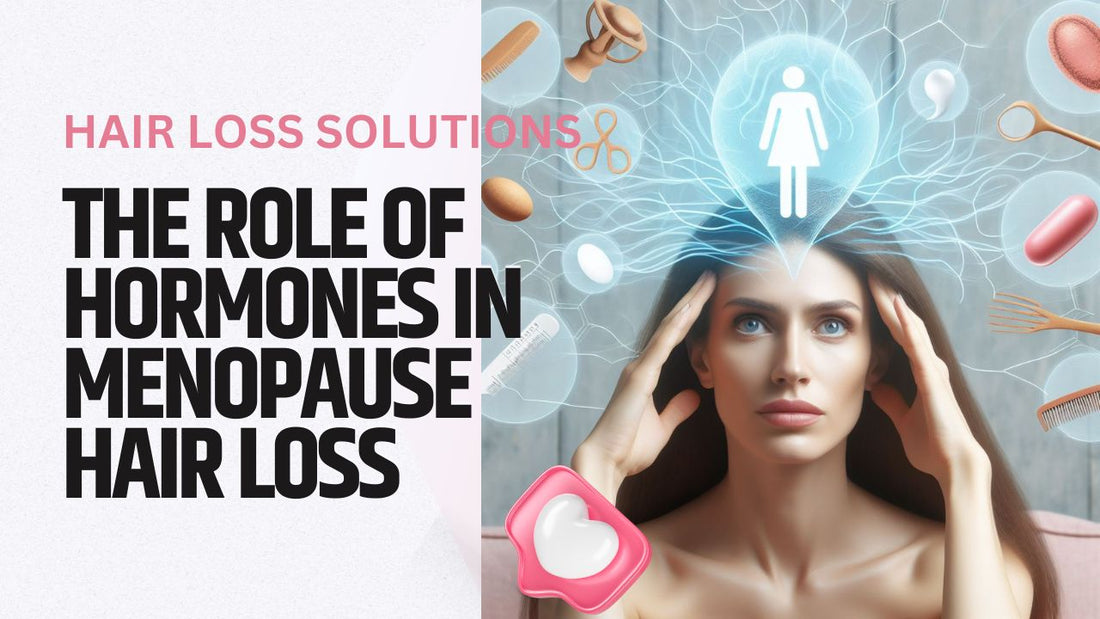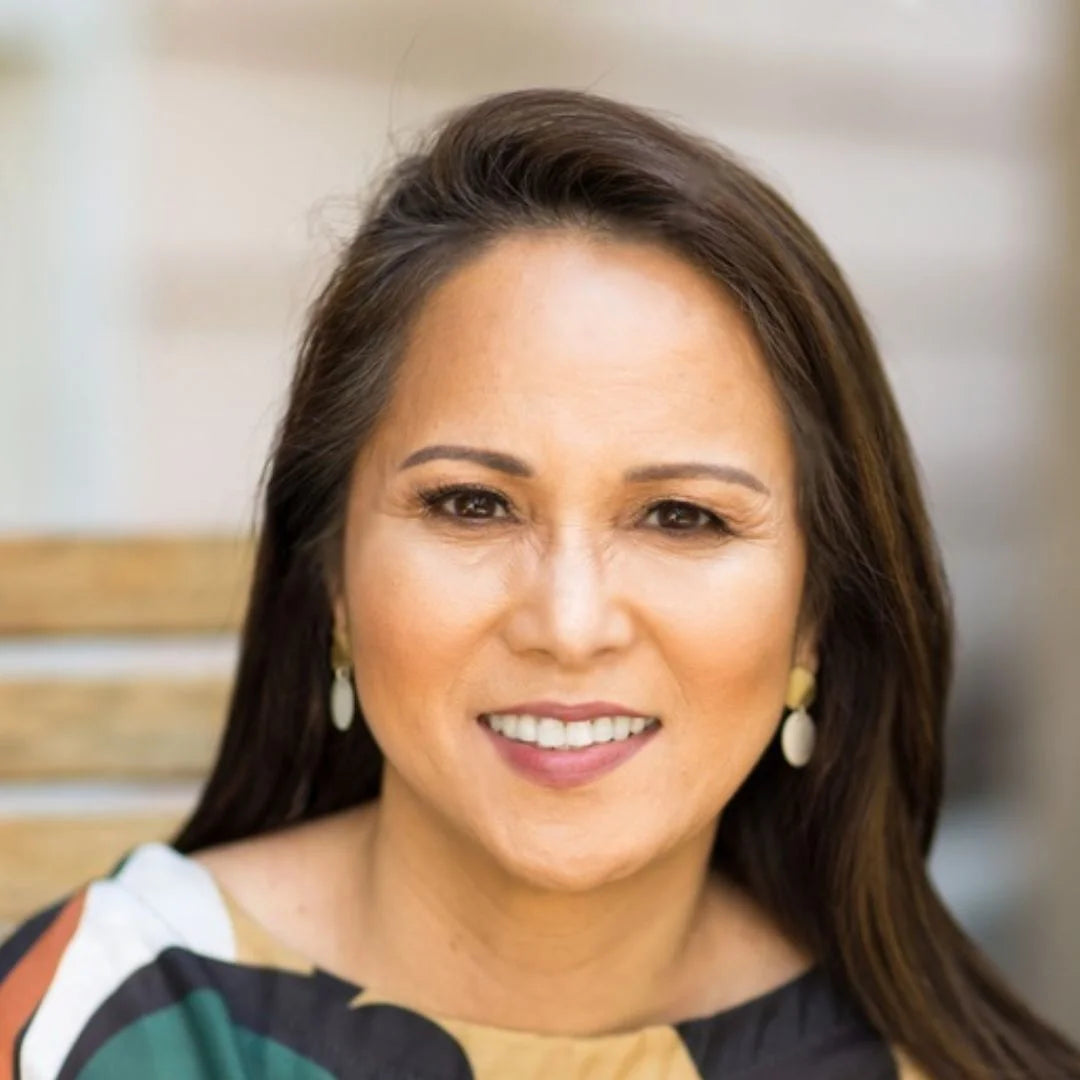
The Role of Hormones in Menopause Hair Loss
Share
Menopause marks a pivotal transition in a woman's life, characterized by significant hormonal upheaval that affects not only reproductive health but also various physical attributes, including hair. This article aims to unravel the intricate role of hormones in menopause-related hair loss, offering insights and strategies to manage this often distressing symptom.
Introduction
As many women approach menopause, they begin to notice changes not just in their menstrual cycle but also in their hair's health and appearance. Hair loss during menopause is a common yet poorly understood phenomenon that significantly impacts self-esteem and emotional well-being. This comprehensive guide explores how hormonal fluctuations contribute to hair loss and what can be done to mitigate these effects.
Understanding Menopause
Menopause isn't merely the end of fertility but a complex biological process that can affect a woman's health across various dimensions.
What is Menopause?
Menopause occurs when the ovaries cease producing eggs, leading to a decrease in estrogen and progesterone levels. This typically happens between the ages of 45 and 55 but can vary widely among individuals.
Signs and Symptoms of Menopause
While most are familiar with hot flashes and irregular periods as hallmarks of menopause, hair thinning and loss are also significant symptoms. These changes are primarily due to the body's reduced ability to produce estrogen and progesterone—hormones that play crucial roles in hair growth and retention.
Hormonal Changes During Menopause
The hormonal shifts during menopause are the primary culprits behind many of the physical symptoms women experience, including changes in hair health.
Role of Estrogen and Progesterone
Estrogen helps hair grow faster and stay on the head longer, leading to thicker, healthier hair. Progesterone supports hair growth as well but on a different scale. As levels of these hormones drop, hair grows more slowly and becomes noticeably thinner.
Androgens and Hair Loss
Although androgens (male hormones) are present in smaller amounts in women, their relative increase during menopause can contribute to hair loss. Androgens shrink hair follicles, leading to hair thinning and loss on the scalp but increased hair growth on the face.
Scientific Studies on Hormonal Impacts
Understanding the hormonal changes during menopause is crucial, but it's also important to ground our knowledge in scientific research that illustrates the direct impacts these changes have on hair loss.
Research Overview
A plethora of studies has focused on the role of hormones in hair loss during menopause. These studies consistently highlight the significant impact of estrogen and progesterone decrease, which directly correlates with the thinning and weakening of hair.
Case Studies
Several case studies provide concrete examples of how hormonal treatments can potentially reverse hair loss effects in menopausal women. These instances offer hope and potential pathways for those struggling with this condition, suggesting that with the right approach, improvements can be observed.
Managing Hormonal Hair Loss
With a better understanding of the hormonal causes behind hair loss, we can now focus on effective management strategies that encompass both medical treatments and natural remedies.
Medical Treatments
For many women, medical interventions such as hormone replacement therapy (HRT) can be a game-changer. HRT helps to replenish estrogen and progesterone levels, potentially mitigating hair loss. However, it's crucial to discuss the benefits and risks with a healthcare provider to ensure it's a suitable option for your specific health profile.
Natural Remedies
In addition to medical treatments, natural remedies and lifestyle adjustments can significantly affect hair health:
- Vitamins and Supplements: Ensuring an adequate intake of vitamins D, B12, and iron can support hair health. Supplements like biotin and omega-3 fatty acids are also known for their benefits to hair density and growth.
- Herbal Treatments: Herbs such as saw palmetto and horsetail extract can mimic hormone-balancing effects and support hair growth.
Spotlight on Proactive Rosemary Hair Booster Oil
Integrating specialized hair care products like Proactive Rosemary Hair Booster Oil can also play a crucial role in managing menopause-related hair loss.
Benefits of Proactive Rosemary Hair Booster Oil
This product is formulated with natural ingredients known for their hair growth and scalp health benefits. Rosemary oil, in particular, has been shown to improve blood circulation to the scalp, which encourages hair growth and can counteract the effects of hormonal imbalances.
How to Use Proactive Rosemary Hair Booster Oil
Incorporating this oil into your daily hair care routine can be done in several ways:
- Direct Scalp Application: Massage the oil into your scalp regularly to stimulate blood flow and deliver potent nutrients directly to the hair roots.
- As a Conditioner Booster: Add a few drops to your regular conditioner to enhance its nourishing effects and leave your hair feeling stronger and fuller.
By understanding the scientific background and applying these targeted treatments and products, women can take active steps toward maintaining their hair health during menopause.
Creating a Supportive Hair Care Routine
To combat hair loss during menopause effectively, it's crucial to adopt a holistic approach that includes proper hair and scalp care, dietary adjustments, and lifestyle changes.
Daily Hair Care Practices
- Gentle Handling: Avoid harsh treatments and minimize stress on your hair by using a wide-tooth comb and avoiding tight hairstyles.
- Regular Moisturizing: Apply hydrating products to keep your hair supple and resistant to breakage. Look for conditioners, leave-in treatments, and natural oils that hydrate and strengthen hair.
- Protective Styling: Opt for hairstyles that limit exposure to environmental stressors and reduce physical damage from styling tools.
Dietary Changes to Support Hair Health
- Nutrient-Rich Diet: Consume a balanced diet rich in vitamins and minerals that support hair growth, such as vitamin C, vitamin E, zinc, and proteins.
- Stay Hydrated: Drinking plenty of water helps to keep the hair hydrated and healthy.
Exercise and Stress Reduction
- Regular Exercise: Engaging in regular physical activity can improve overall circulation, including to the scalp, which is beneficial for hair growth.
- Stress Management: Practices such as yoga, meditation, or regular relaxation activities can reduce stress levels, which in turn can help reduce hair loss.
Empowering Your Hair Care Journey
Embracing Change with Understanding and Care
Understanding the hormonal basis of menopause-related hair loss allows for more effective management. By embracing this change and adapting your hair care routine, you can maintain the health and appearance of your hair during menopause.
Seeking Professional Advice
For those experiencing significant hair loss, it may be beneficial to consult with a dermatologist or trichologist who can offer personalized advice and treatment options based on your individual health needs.
Frequently Asked Questions
Can lifestyle changes alone stop menopause-related hair loss?
While lifestyle changes alone may not stop hair loss completely, they can significantly mitigate the effects and improve hair health.
How often should I use hair treatments like Proactive Rosemary Hair Booster Oil?
Using treatments such as Proactive Rosemary Hair Booster Oil 2-3 times a week can help improve scalp health and promote hair growth.
Are there any specific hair care products you recommend for menopausal hair?
Products that are sulfate-free, hydrating, and designed for thinning hair are ideal. Look for items that contain natural ingredients like rosemary oil, biotin, and niacinamide to support hair health.
Conclusion: Thriving Through Menopause with Vibrant Hair
Menopause is a natural stage of life that brings many changes, including hair health. By debunking myths, applying scientific understanding, and following through with a holistic approach to hair care, you can thrive through menopause with vibrant, healthy hair. Remember, this journey is about more than just maintaining hair; it’s about nurturing your overall well-being and embracing each phase of life with confidence and grace. For more detailed guidance and support on managing menopausal hair loss, don't hesitate to reach out to healthcare professionals and explore further resources.













